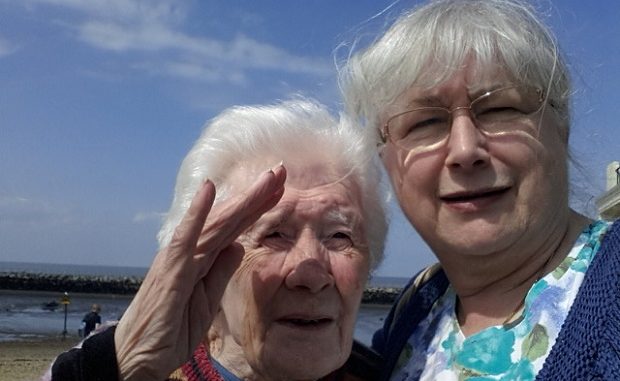
Thanet is leading the way with a service that matches seniors who would welcome some extra support at home, with seniors who want to help.
The Seniors Helping Seniors franchise in Thanet started trading in 2014 to show it could work in a relatively poor area compared to the rest of the county. Now four other offices in Harrow, Guildford, Tonbridge, Ashford are replicating the Thanet way of working.
The overarching UK arm of the business has been running 20 years under the stewardship of husband and wife Christian and Sally Wilse.
The model impacts the lives of caregivers, as well as those receiving care, with mature helpers providing help at home or out and about. Services include companionship, meal time help, shopping, transportation, medical appointments, hospital discharge, welcome home and convalescence, dementia care, respite care, holidays and overnights, housekeeping, house maintenance and repairs, gardening, pet care and more.
The Thanet scheme has 19 senior aged carers living and working on the isle plus one living in Canterbury but working in Thanet. There are currently eight client families.
The project has been granted a £10,000 award to help with promotion and awareness raising in the south east.
Mr Wisle said: ““The public relations support will be used to raise awareness of the work we are doing in Surrey, Middlesex and Kent, with a view to enlisting more people to join us across the South East and East of England. We envisage the prize will help us to impact the lives of millions more elderly people in the next 18 months.”
Seniors Helping Seniors – a customer viewpoint
I first became aware of Seniors Helping Seniors (SHS) through a brochure provided by a dementia outreach unit based at Age UK, Canterbury. I was exploring options for care for my mother Louise, then aged 89 who had had dementia for about eight years. Her dementia was presenting mainly as severe short-term memory loss – she still had (and continues to have) all her former charming personality and social skills – but moments of disorientation were increasing and we needed to do something to help keep mum safe.
Louise was still living at home by herself at the time, having lost her husband a few years earlier. She was coping reasonably well and was adamant that she did not want any nursing support or to go into a home – but did have lunch time meals delivered 3 times a week and enjoyed visits to the Age UK day centre on 3 other days.
My two sisters and I and other close family members were providing support but, with us children all in full time jobs and living away , Louise still had long periods on her own – and lack of social contact could seem to trigger disorientation. Disorientation mainly took the form of being convinced the house where she had lived for some 60 years was not where she should be and she longed for her childhood home and could not understand how she had “arrived” where she was.
It was after one or two more worrying incidents when mum was found wandering and looking lost in the street that I rang the dementia outreach team and picked up some information on support options, including the SHS brochure.
Among the wealth of literature available, I was attracted to the SHS brochure for several reasons. Like many of her generation Louise has always prided herself on her self-reliance and was, as I have said, very resistant to nursing support – even when she was caring at home for her bed-confined husband in his last days she wanted to do it all without help. She was adamant about not wanting to go for residential care – so some kind of support at home was needed. Moreover, I needed to pass off Louise’s carers as “other retired ladies on their own, popping in for a chat” or as “friendly neighbours”. This would not work if there were uniforms involved or a large age difference. The generally more senior staff working for SHS was thus ideal and there were no uniforms in sight in the brochure! They also provided the companionship care we were looking for and had staff very experienced with dementia sufferers.
We were nervous to take the plunge – wanting to get the right balance of independence and care for mum – and contacted the manager of SHS Canterbury. He took great pains to understand my mother’s situation and the family concerns and did not press for any commitment, giving us time and information to decide. From information I provided he identified SHS carers that would be suitable and we discussed at length the best way to introduce Louise to one of them – a lady retiree from a caring profession (and shall we say between my age – I am Louise’s son – and mums!) in a trial run. The visit duly took place and, although Louise was somewhat surprised and bemused – the success was evident from later visits when – from mum’s beaming smile – she was evidently very pleased to see her “new friend”.
From that point we have not looked back. SHS have helped us wonderfully on very many levels as we have, in stages, increased their visits as needed, and have been a constant and utterly reliable support through the gradual worsening of Louise’s dementia and eventual move into residential care.
Anyone interested in the services provided by Seniors Helping Seniors can find out more at www.seniorshelpingseniors.co.uk or call Sally / Christian direct on 01227 454 900.

